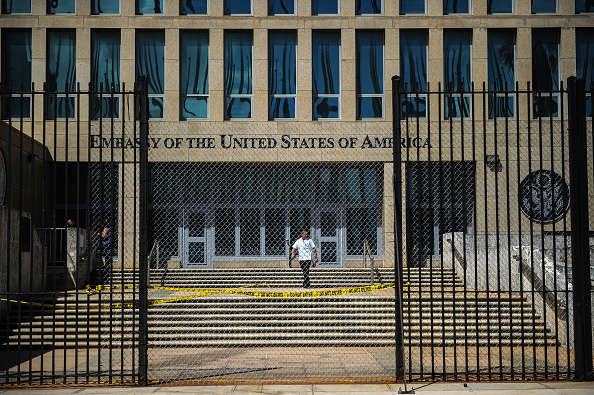There is frightening new evidence to suggest the Cuban sonic attacks are real


Mysterious "sonic" attacks targeting American diplomats in Cuba are so unlike anything State Department and FBI officials have ever seen that the Cuban government's claim that the high-pitched whirring sounds reported by U.S. Embassy staff are just cicadas seems almost plausible. Doctors treating victims of the attacks, though, have now found visible, perceptible damage to patients' brains, marking the first solid evidence that the sophisticated weapon described by embassy staff is entirely real, The Associated Press reports.
The futuristic attacks began last fall when U.S. diplomats abruptly started to lose their hearing. Eventually, at least 24 people reported symptoms including "mild traumatic brain injury, permanent hearing loss, loss of balance, severe headaches, and brain swelling," The New York Times reports, adding that "the FBI has been unable to duplicate the effects the diplomats have experienced in a lab." The United States pulled approximately 60 percent of its staff off the island as a safety precaution. In November, evidence arose that a USAID officer working out of Uzbekistan experienced a similar attack, giving credence to the theory that Russia is responsible.
American doctors discovered that the attacks led to changes in the white matter tracts of the brain — the material that allows brain cells to communicate with each other. Some officials cautioned that the attacks might not be "sonic" at all, and rather the sounds heard by victims are "the byproduct of something else that caused damage," AP writes. Sound waves have never before been known to cause damage to white matter tracts.
The Week
Escape your echo chamber. Get the facts behind the news, plus analysis from multiple perspectives.

Sign up for The Week's Free Newsletters
From our morning news briefing to a weekly Good News Newsletter, get the best of The Week delivered directly to your inbox.
From our morning news briefing to a weekly Good News Newsletter, get the best of The Week delivered directly to your inbox.
While many of the embassy victims have recovered from their symptoms, about a quarter experienced persisting issues. Either way, AP writes that "epidemiologists, who track disease patterns in populations, will monitor the 24 [American victims] for life."
A free daily email with the biggest news stories of the day – and the best features from TheWeek.com
Jeva Lange was the executive editor at TheWeek.com. She formerly served as The Week's deputy editor and culture critic. She is also a contributor to Screen Slate, and her writing has appeared in The New York Daily News, The Awl, Vice, and Gothamist, among other publications. Jeva lives in New York City. Follow her on Twitter.
-
 5 criminally underrated cartoons about Pete Hegseth’s war crime
5 criminally underrated cartoons about Pete Hegseth’s war crimeCartoon Artists take on USS Hegseth, rats leaving the sinking ship, and more
-
 Can Mike Johnson keep his job?
Can Mike Johnson keep his job?Today's Big Question GOP women come after the House leader
-
 A postapocalyptic trip to Sin City, a peek inside Taylor Swift’s “Eras” tour, and an explicit hockey romance in December TV
A postapocalyptic trip to Sin City, a peek inside Taylor Swift’s “Eras” tour, and an explicit hockey romance in December TVthe week recommends This month’s new television releases include ‘Fallout,’ ‘Taylor Swift: The End Of An Era’ and ‘Heated Rivalry’
-
 Nobody seems surprised Wagner's Prigozhin died under suspicious circumstances
Nobody seems surprised Wagner's Prigozhin died under suspicious circumstancesSpeed Read
-
 Western mountain climbers allegedly left Pakistani porter to die on K2
Western mountain climbers allegedly left Pakistani porter to die on K2Speed Read
-
 'Circular saw blades' divide controversial Rio Grande buoys installed by Texas governor
'Circular saw blades' divide controversial Rio Grande buoys installed by Texas governorSpeed Read
-
 Los Angeles city workers stage 1-day walkout over labor conditions
Los Angeles city workers stage 1-day walkout over labor conditionsSpeed Read
-
 Mega Millions jackpot climbs to an estimated $1.55 billion
Mega Millions jackpot climbs to an estimated $1.55 billionSpeed Read
-
 Bangladesh dealing with worst dengue fever outbreak on record
Bangladesh dealing with worst dengue fever outbreak on recordSpeed Read
-
 Glacial outburst flooding in Juneau destroys homes
Glacial outburst flooding in Juneau destroys homesSpeed Read
-
 Scotland seeking 'monster hunters' to search for fabled Loch Ness creature
Scotland seeking 'monster hunters' to search for fabled Loch Ness creatureSpeed Read
